I have a web scheduling app that I'm currently rewriting and have some questions about how to work with recurring appointments (I know there is no shortage of "what's the best way to do this" when it comes to recurring appts).
So I want to offer recurring appointments where the user can schedule an appointment for a date like Sat, June 2nd, and it should repeat every other week on Saturday for some pre-determined time period (like 1 year).
What php functions can help me determine which date "every other saturday" falls on? I'm attaching a picture of my UI for clarification.
